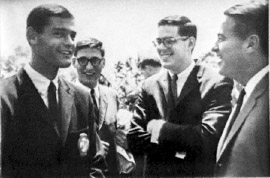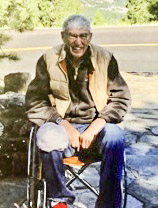The Volunteer Who Lived Peace Corps’ 3rd Goal — Dennis Grubb (Colombia)
by Jeremiah Norris (Colombia 1963-65)

Dennis (2nd from the left with fellow new Colombia PCVs) talks with Sargent Shriver on the White House lawn
Dennis Grubb was an Eagle Scout when he joined the Peace Corps as a Volunteer in 1961, going on to write the first chapter of its history. He was the youngest Volunteer in one of the first groups ever to be sent abroad, serving in Colombia.
He worked in a rural village at the 8,700 elevation of the Andean mountains, a place with no running water or sewers, scant access to electricity, and few paved roads. Illiteracy, malnutrition, dysentery, and TB were rampant. Along with Peace Corps colleagues, Dennis formed a liaison between his village and government officials and secured assistance to build the first cooperative food store, a small medical center, three schools, roads, and a water supply pipeline.
Dennis worked with Colombians at all levels, from farmers to national officials to achieve his overall goal which was to convince the community that they could control their lives. He often said in later times that his idealistic view of a peaceful and humane world was formed by his Volunteer experience in Colombia.
In many ways, Dennis never left the Peace Corps. After his service in Colombia, he went on to train hundreds of Volunteers for Latin America at the University of New Mexico, and Volunteers destined for the Far East at Southern Illinois University. He served as Treasurer and Board Member of the National Peace Corps Association. He was a relentless advocate on Capitol Hill for Peace Corps funding. Senator Hubert Humphrey recognized Dennis’s work, saying to him that “it was largely due to your efforts that the appropriation for the Peace Corps was obtainable.” Dennis helped train the next generations of Peace Corps Volunteers all his life
He earned degrees from the Southern Illinois University, the American University, and the London School of Economics. He studied in Tunisia on a Fulbright Fellowship, and served on the Board of the Fulbright Association from 2009 through 2013.
By training, Dennis was an economist and he went on from Peace Corps activities to become a banker, building a career at Schroders, New York and London; DLJ Equity and Debt Capital Markets at Credit Suisse; and at Merchant Bank of Sri Lanka, at which he served as President. The advent of cable television let him to devote 10 years to directing the nationwide franchise at United Cable Television before forming Cable Satellite Investments, a consulting firm for the development of equity investments in cable television systems nationwide and abroad.
At times, his work in emerging countries endangered his life. While working in Sri Lanka, Dennis survived not only a tsunami but also a suicide car bombing at the main entrance of the Bank of Colombo where he had an office. Fifty-one people were killed and the president of the bank, who was critically wounded, asked Dennis to serve as temporary president until a permanent replacement could be hired.
This experience enabled Dennis to spend 30 years working in 23 countries on projects in international banking, securities, and debt markets for Deloitte, Ernest & Young, and PwC. He helped introduce financial reforms in India, Thailand, Ukraine, and Romania. At PwC, he played a central role in the transformation of India’s capital market, serving as Chief of Party for USAID’s ‘Financial Institutions and Project Expansion’ in 1994-1998.
While working in India in the 1990s, Dennis became a friend of Mother Theresa. As he wrote of that experience, “She invited me to pray with her in Calcutta, which I did. While praying with her, I learned not to anticipate HIS WORK and to try not to put anything of my own in all this. I am His instrument, nothing more”.
Dennis worked in 23 countries, which included some of the world’s poorest nations. He experienced suffering and plain, simple happiness first hand. When returning home from these countries he left most of his belongings as he felt that poor people needed his clothes and shoes more than he did. In traveling to so many countries, he saw the world as a place where people are more alike than different, all wanting the same things for their loved ones: freedom and the chance to live a peaceful, decent life.
 The U. S. News & World Report and Life both published articles, featuring Dennis on the Peace Corps’ work in Colombia in 1961, 1962 and 1986. His photograph appeared on a Peace Corps promotional flyer in 1962 displayed in Post Offices across the U. S. Sargent Shriver called him “one of the first and one of the best Peace Corps Volunteers”.
The U. S. News & World Report and Life both published articles, featuring Dennis on the Peace Corps’ work in Colombia in 1961, 1962 and 1986. His photograph appeared on a Peace Corps promotional flyer in 1962 displayed in Post Offices across the U. S. Sargent Shriver called him “one of the first and one of the best Peace Corps Volunteers”.
In that time of his life, astride a maelstrom of constant want and need, Dennis never let his 15 minutes of ‘fame’ define his lifelong service and commitment to helping others less recognized in nations on five continents, meriting him a well-deserved Profile in Citizenship.
Thank you, Jerry. Dennis Grubb needs to be remembered by all of us. He set a wonderful example.
Dennis Grubb was a friend and co-advocate for the Peace Corps for over 50 years. My father, former State Senator Fred Farr adopted Dennis when my dad worked Washington for the Johnson administration. Our lives were full of stories and laughs. Seems where ever I went, Dennis showed up to be supportive and constantly curious..I loved the way he wove his work overseas with returning to the US and reconnecting with friends. When I was elected to Congress from California, Dennis was in DC to greet me. My brother in Peace Corps arms.
Dennis was a character. He was good and did good. We bonded over being Returned Colombian Peace Corps Volunteers. My life was richer knowing Dennis. I’ll never forget him. Congressman Sam Farr (Retired).